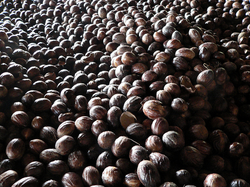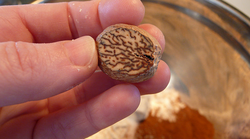
Native to Indonesia, nutmeg (Myristica fragrans) is a spice created from the kernel/seed or nut of a fleshy green fruit of the nutmeg tree. The small brown nutmeg is enclosed by veins of mace, which is also used as a spice. It is an extremely versatile spice which gives a warm, resinous and soothing, blending flavour to dishes and drinks.
Although nutmeg originates in Indonesia, it is quite widely grown in such areas as Malaysia, the Caribbean, Guadeloupe and Martinique. The largest source of nutmeg is Grenada.
There are related species of nutmeg but the Myristican fragrans is the commercialised species. Other nutmeg species include the Papua nutmeg M. argentea (New Guinea) and Bombay nutmeg, M. malabarica.
Use of nutmeg
Nutmeg is usually consumed in powdered or grated form. While it is possible to purchase it already grated or powdered, it is best when prepared fresh just prior to cooking. It is usually available all year round.
Nutmeg has both sweet and savoury uses in cooking. It is used in puddings, custards, cakes, biscuits (cookies) and other sweet baked and cooked goods. It is also used in stews, to flavour vegetables and for dishes that feature cheese, milk and eggs. Another use is adding to mulled drinks and on top of the froth of drinks like coffee and hot chocolate. Food that is creamy or milky often goes well with nutmeg, as does the combination of nutmeg over spinach or leeks.
Nutmeg is also added to spice mixes, ales and other fermented drinks, pastes (such as the jerk pastes in the Caribbean) and is an important ingredient in the Christmas pudding for the Christian festival of Christmas.
Essential oil of nutmeg can be used to treat certain ailments, such as indigestion, flatulence and easing muscular and joint pain. It is good for bad breath, stimulates circulation and the intellect. Essential oil of nutmeg should be used sparingly as it is toxic in high doses (and can cause hallucinations). Essential oil of nutmeg should never be taken by pregnant women.
Fresh nutmeg is no longer considered to have medicinal purposes, although it is still being studied for its anti-bacterial potential.
Nutmeg butter is similar to cocoa butter and can be used as an industrial lubricant.
Nutmeg is sometimes coated with lime to repel insects.
Preparing nutmeg fresh

There are special nutmeg graters and grinders that can be purchased for use with nutmegs. However, a sharp knife is also effective for shaving off thin slices from the nutmeg.
Storing nutmeg
Nutmeg will stay fresh for longer if stored in an airtight container. Things that impact the flavour and freshness of nutmegs include moisture, heat and direct sunlight.
Precautions
Nutmeg has hallucinogenic properties when taken in high doses. It's fine to cook with in low doses; it'd take grinding more than two whole nuts into a dish to have such an effect. The side effects of too much nutmeg include nausea and a long-term hypersensitivity to nutmeg.
Never use broken nutmegs for consumption, as they may be contaminated by pests or the very dangerous moulds that produce atafloxines.
Nutmeg in other languages
Here are some ways to say nutmeg in other languages:
- Noix de muscade, muscade – French
- Muskatnüss, mustkatnuß – German
- Pala – Indonesian
- Noce moscata – Italian
Sources and citations
- Michael Bateman, The World of Spice, (2003) – research source
- Nerys Purchon, Handbook of herbs, p. 301, (2002) – research source
- http://www.uni-graz.at/~katzer/engl/Myri_fra.html – research source